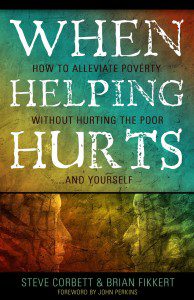 This post first appeared here at the blog of the Hendricks Center for Christian Leadership and Cultural Engagement.)
This post first appeared here at the blog of the Hendricks Center for Christian Leadership and Cultural Engagement.)
In this installment of our series featuring resources on Faith, Work and Economics, we recommend When Helping Hurts by Steve Corbett and Brian Fikkert
When Helping Hurts presents foundational concepts about poverty from a distinctly Christian worldview, focusing on key principles and practical strategies for churches and individuals to reflect God’s grace while effectively contributing to poverty alleviation. Using a variety of engaging stories, the authors suggest appropriate ways for North American churches and missionaries to engage the culture in terms of local and international poverty alleviation. The book is designed for both individual and group study, and includes helpful reflection questions and exercises. Related resources are available at www.whenhelpinghurts.com and www.chalmers.org.
3 Key Points from the Book
This book is full of biblical insight and practical strategies anyone can understand. Here are just three things you’ll learn by reading Corbett and Fikkert’s work on poverty alleviation.
Poverty alleviation is a ministry of reconciliation
God established four foundational spheres of responsibility for human beings. First, a relationship with the loving, relational God. Second, a relationship with yourself—a person created in God’s image, endowed with inherent worth and dignity. Third, a responsibility toward other people. And fourth, a relationship with the rest of creation as stewards. Sin damaged these relationships, and we see the resulting dysfunction in the economic, social, religious, and political systems we have created. Poverty is the absence of shalom. Poverty alleviation helps people move closer to a right relationship with God, themselves, others, and the rest of creation so that they can fulfill their callings to glorify God and support themselves and their families through their work.
Paternalism reduces dignity and slows growth
How often do we begin a relationship with the poor by essentially asking “What’s wrong with you? How can we fix you?” One reason for the slow progress in poverty alleviation is inadequate participation of poor people in the process, fueled by a paternalistic approach to assistance. Instead, avoid doing things for people which they can do themselves. The authors suggest Asset Based Community Development (ABCD), which begins by identifying the resources already present within the poor community. How can the poor steward their existing resources? This affirms their dignity, empowers them, and contributes to the process of overcoming their poverty. Then we can see them like God does.
When to apply relief, rehabilitation and development
The authors explain that, “one of the biggest mistakes we make is in applying relief in situation in which rehabilitation or development is the appropriate intervention” (p. 105). While relief is immediate, temporary assistance, rehabilitation means working with people who participate in their own recovery. Development is related to ongoing change efforts to move both the helper and ones being helped toward a closer relationship with God. In order to be truly effective, churches and individuals should not try to focus on all three areas in their ministries. Rather, we should focus on supporting relief, rehabilitation, or development efforts in a given location—giving much more focus to effective development in order to produce lasting change.











